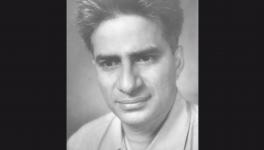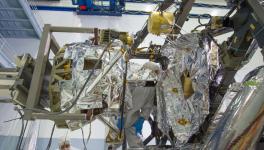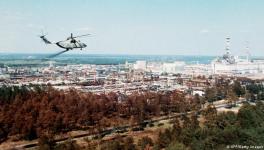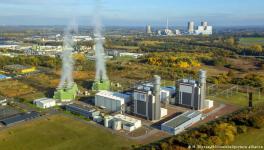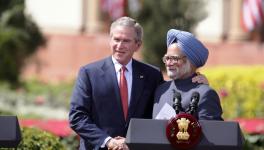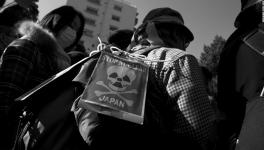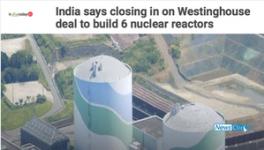Kudankulam Nuclear Reactors- Protests persist as government suffers from credibility crisis
D. Raghunandan of the All India Peoples' Science Network argues for an independent review of nuclear safety measures and audit said to be concluded by the Atomic Energy establishment of the Indian government. Protestors in Kudankulam and elsewhere are unwilling to trust the government's claims of safety of the nuclear reactors, because there is a large credibility gap. This can only be breached if an effort is made to bestow autonomy to the Atomic Energy Regulatory Board and safety concerns after the Fukushima incident over nuclear energy are sufficiently allayed through independent review of the existing programme.
Rough Transcript
Srinivasan Raman (SR): Hello and welcome to Newsclick. Just a month since Fukushima nuclear disaster, an event that's still playing it's recount, a rethink on nuclear programmes has happened across the world. Some have retrenched their nuclear programe and some have even halted their plans for nuclear energy. Only few months ago we had protests in Jaitapur in Maharasthra against a nuclear plant which was supposed to be imported from ' France' that has been in protest again long pending and soon to be commissioned VVER plant imported from Russia in Kudankulam in South Tamil Nadu. We have with us D. Raghunandan, President of the All India People's Science Network Raghu Welcome to Newsclick. Tell us something about VVER reactors imported from Russia. The Nuclear Power Cooperation of India says that these reactors are quite safe in fact they have forced the Russians to modify the reactors so as to keep the safety stand. How credible are these stands?
D. Raghunandan (DR). VVER reactor is a much later designed reactor than the Fukushima one. So it stands to be reasoned that it would be safer than earlier models or earlier reactors. I don't think that is the issue so much in terms of the safety aspects themselves because what I think Fukushima, before that Chernobyl, before that Three Mile Island have all shown is each time an accident takes place it is been due to new factors. So the issue is not that yesterday Chernobyl happened so you do something so that a Chernobyl type accident doesn't repeat or Fukushima happened and then you do something in case Tsunami comes. I think these are different circumstances, different contexts in which the Nuclear Plant exists and to say that the VVER reactor is safer than one at Fukushima is true but it doesn't say much
SR: But at the same time, location of the Kudankulam is close to the area which was effected by Tsunami long ago. So do you think the authorities have done enough to allay the fears.
DR: See, that is the sixty four million dollar question right now. There are fears whether the authorities have done enough in terms of design, in terms of safety precautions, one is not sure and that's precisely the worry. The fact that people are scared is a reality. People are scared after Fukushima because supposedly it was taking place Fukushima that is in a society context where a lot of safety measures had been taken. Yet the disaster took place. Now this side, Kalpakkam had also been visited by Tsunami last time although by the time Tsunamis had reached India shores the effect was not that much and some precautions have been taken here. You don't have a force feed cooling system. You have a gravity fed cooling system.But we don't know what is the capacity of the cooling system. How man hours or days will it be able to cool the reactor because what we saw happened in Fukushima is that the coolant circulatory system had collapsed because there was no power but even if there had been power what is the water they would have accessed to that also we don't know. The same question might arise here. The real issue I think to me is the fact that the question you asked have the authorities done enough to allay fears I think the answer is very clearly known.
SR: That has given rise to heighten sense of insecurity in terms of fishermen protesting that having a nuclear reactor close by result in their catchment area being destroyed and fishing not possible and so on and so forth. Are they valid concerns?
DR: I am not too sure about those because in Jaitapur, Tarapur and so on, I am not sure the real concerns were these. The extents to which localized heating of the water takes place would affect some fishing in a small area perhaps a kilometer on either side by the time you get further than a kilometer, I think dilution by the sea water would have taken account of rising temperatures. In that sense, a nuclear power plant located on the coast looks more or less disruptive than a port. Perhaps, a port may even have a larger impact in terms of displacing fishermen, displacing normal activities. So to that extent, any industrial plant located on the sea is bound to have some impact on local economic, traditional economic activities. But I don't think that is the major concern here. The major concern here still pertains to safety. There, we have had in the last month or so assurances from the NTPC, assurances from the Atomic Energy Regulatory Board and now assurances from Prime Minister himself that everything is all right, everything is safe. I am afraid this no longer convinces anybody.
SR: It no longer convinces anybody because the functioning of the nuclear energy sector is non transparent.
DR: For both, for two reasons. If you look at Fukushima in Japan, Japan is a society that have traditionally respected those in authority whether it is government, whether it is technocrats. It comes as a big shock to them if there is a failure of governance, failure in other ways, maleficence of any sort. Even after Fukushima, people took their authorities at their word. Going along with precautions that were taken, displacement and so on. It was only after month or so, even the traditionally quiescent and extremely tolerant Japanese people finally realised that the wool was being pulled over their eyes. The people were not being forthcoming about the reality about how much damage was being caused, how much damage was caused to dairy products, to vegetables, to habitation, to the sand lots in which children were playing outside schools and today I believe the biggest impact in Japan apart from radioactivity has been the shattering of confidence in authority as a result of Fukushima. In India, people neither traditionally tolerant of authority nor authority commanded such respect both due to the sociological conditions in this country as well as the behaviour of the people in authority and people off late in the last two years have developed a very deep suspicion on those authorities whether that is various scams that has taken place whether it is addressing poverty issues why should the public takes the Prime Minister's assurance on Kudamkulam seriously when a similar assurance that everything is all right with the 2G scam, rules were followed were shown not to be true. When those in authority today say if you earn more than thirty five rupees a day you are all right, you are not poor. People have today very deep suspicion and in the nuclear fuel, we have just seen the government having come out with a draft bill with a Nuclear Regulatory Authority which far from giving autonomy and independence to the Nuclear Regulatory Authority which should have been done and which activists have been demanding for such a long time has actually has gone in the reverse direction and has created a Nuclear Regulatory Authority which is answerable to the government in a very single word. So under circumstance like this and assurance by the Prime Minister that everything is safe I am afraid will not cut any ice.
SR: Having said that lack of credibility gap that is present in government that has given a situation where there is deep skepticism about not the just real government has functioned but about the Nuclear Energy itself. There are demands of moratorium on any new prouject that has happened unless safety reviews are done, the existing plans also and there is also antithetical attitude against nuclear energy per se. Do you share that attitude?
DR: See, I think there are two aspects of this. One is there are those who have decided long time ago that before Fukushima, before Chernoby that nuclear energy is unsafe and should not be allowed to happen in this country. Chernobyl and Fukushima reinforced their views and their convictions. After Chernobyl and Fukushima there are many people shall we say on the fence who are undecided about in principle objections about the nuclear energy who now seem come to the opinion look things can go so wrong that may be it is better to err on the side of caution than to err on the side of bravado. My own feeling is that the last word has not been said in the subject of nuclear energy. In particular for e.g. India is soon going to commission a fast breeder reactor. This will be a milestone in nuclear energy production and research. It is ultimately a research reactor being taken up to a commercial scale. Now would one take a stand against that. I would still go back to what I believe is the formulation appropriate for the current context which is you need a thorough safety audit of all nuclear plants. You need a complete separation of the nuclear energy establishment from government and the powers that be. You need the veil of secrecy lifted from nuclear energy and you need a credible and completely independent nuclear regulatory authority. Today the country is clamoring for an effective Lokpal bill because there is a belief that corruption will not be checked by people from inside the system. Similarly, there is no reason to believe that any wrong doings, any malpractices within the nuclear establishment are going to be corrected from within the system. You must create credible independent bodies outside the system. The government today says, it has conducted the safety audit after Fukushima. Nobody knows what the safety audit is. Safety audit must be made public. There are people today who are retired Nuclear Engineers and Scientists who are amongst us who can review those, who are independent experts then there is a possibility of confidence being restored. Without these measures, I believe it will not be possible even for those who have strong convictions that nuclear energy can be made safe to convince people that this is so.
SR: You are arguing for accountability in the system and that means a pre-requisite for sustaining this programme.
DR: Unless you have a truly credible and accountable system which takes the public into confidence which includes public participation as a major element in planning for citing of operation of nuclear reactors and conducting periodic safety reviews, I think this problem will not be solved and in fact, the history of nuclear accidents show that those countries which have maintained maximum secrecy and the least transparency in running those nuclear plants are those which had the most problems.
Get the latest reports & analysis with people's perspective on Protests, movements & deep analytical videos, discussions of the current affairs in your Telegram app. Subscribe to NewsClick's Telegram channel & get Real-Time updates on stories, as they get published on our website.









